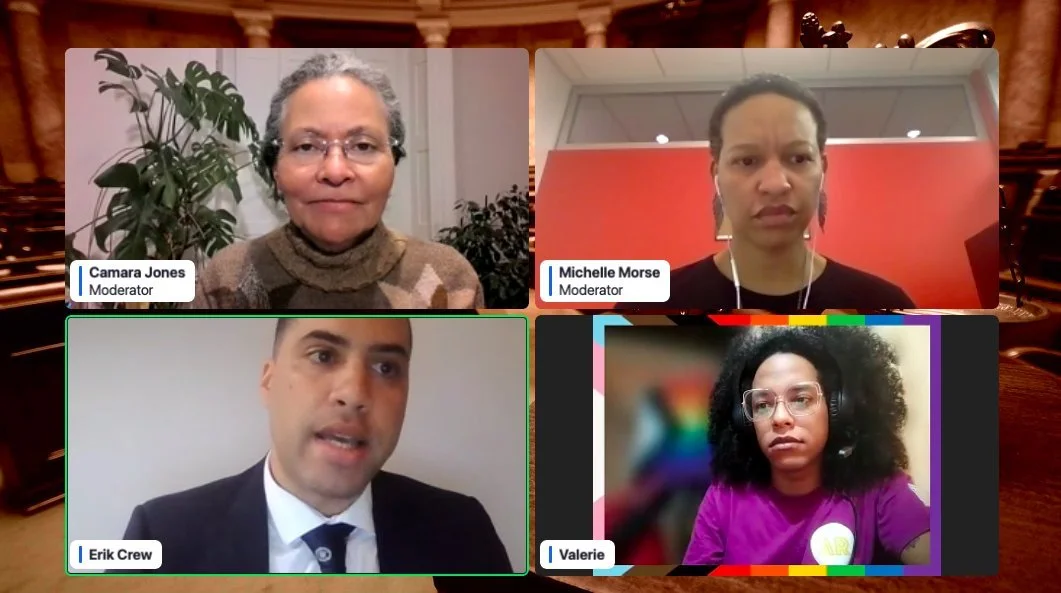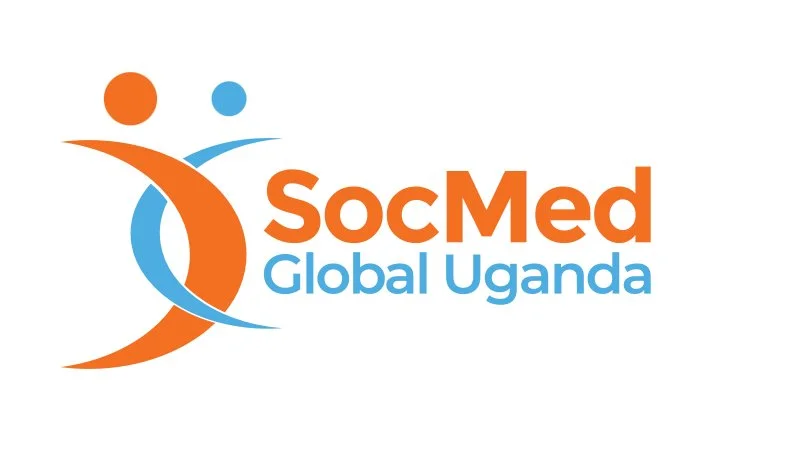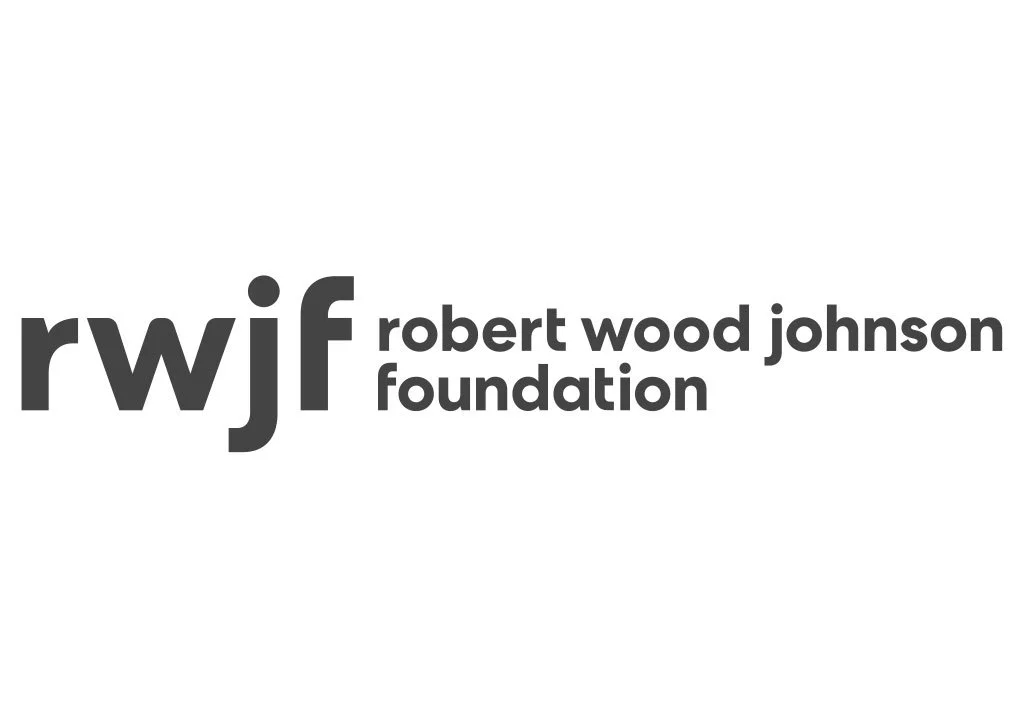
2024 Annual Report
A Message from EqualHealth’s Leadership Team
Dear community,
This past year has been a challenging, yet transformative, year for EqualHealth. Despite the hardships our communities across the world have faced, our commitment to building collective global action in pursuit of health equity for all has never been stronger.
Throughout 2024, our team—composed of an extra-ordinarily dedicated group of staff and volunteers—tackled inequity across institutions and our broader society across a multitude of avenues.
Over the last year, we:
Hosted retreats centered on healing and restorative justice with our global community, facilitated by our partners in South Africa,
Received a record-breaking number of applications to our transnational social medicine course,
Presented at the United Nations’ CERD (International Convention on the Elimination of All Forms of Racial Discrimination), and
Supported collective dialogues on building transnational strategies to struggle against anti-Blackness and the migration industrial complex,
and more.
Our work challenged us to lean into moments of vulnerability and tension as opportunities for powerful growth. Through a leap of faith into authenticity with one another, we learned invaluable lessons about EqualHealth—not just as individuals coming together for a common vision of justice, but as a collective organization united toward a vibrant future.
With reflection and gratitude, we are now honored to share our learnings with you via our 2024 annual report. In this summary, you will hear from our voices in the field—community-based health organizers, medical students and professionals, and equity advocates—about the diverse initiatives of our program teams: the Campaign Against Racism (CAR), Social Medicine Course (SocMed), and Mutual Aid.
Now more than ever, EqualHealth’s mission is critical: By strengthening a global community of health professionals, educators, and activists who are dedicated to the fight for health justice, we can radically imagine a future in which sociocultural, political and economic systems work towards health equity, rather than against it.
Your engagement with EqualHealth is more valuable than you know. Thank you for supporting us as we prepare health professionals to recognize the structural and social determinants of health.
In solidarity,
EqualHealth Leadership Team
Our Global Community
Our Campaign Against Racism (CAR) has 17 chapters across the world committed to local actions in building global solidarity, while our Social Medicine Course (SocMed) offers transnational graduate-level health education to professional students in Uganda, Haiti, and the United States.
Voices in the Field
-
“What excites me about what we are doing right now is that we are deeply rooted in organizing against systems of oppression,” said Nabirye Peruth, Health Equity Organizer for EqualHealth’s Campaign Against Racism (CAR). “From our fellowship, we are able to understand systems of oppression and passionately work against them. We stand on the pillars of personal, praxis and partnership.”
-
“EqualHealth’s work continues to play a very important role, particularly in building consciousness for health professionals to be able to understand all the complex systems and structures that contribute to health inequity,” said Tinashe Goronga, Program Manager for EqualHealth’s Campaign Against Racism (CAR).
-
“I’ve seen the power of EqualHealth’s impact firsthand,” said Youri Encelotti Louis, Social Medicine Course Supervisor. “Our social medicine students don’t hesitate to engage in deep listening and transformative self-reflection that shapes them into powerful leaders for health equity. In our current political climate, with international programs being slashed and racism on the rise, our justice-focused programs are more critical than ever.”
Guiding Frameworks
Social Medicine
Social medicine is an approach to health that recognizes the centrality of the social and structural determination of health, integrates social theory to understand social forces that marginalize and harm communities, and builds collective power to challenge oppression and support the struggle for social justice.
Health Equity
Health equity is the state in which everyone has a fair and just opportunity to attain their highest level of health. Achieving this requires ongoing societal efforts to address historical and contemporary injustices; overcome economic, social, and other obstacles to health and health care; and eliminate preventable health disparities.
Social Justice
Among its many definitions, social justice promotes a just society by challenging injustice and valuing diversity. It exists when all people share a common humanity and therefore have a right to equitable treatment, support for their human rights, and a fair allocation of resources.
Language Justice
Language justice describes the human right to communicate in the language one feels most comfortable in, without fear of discrimination or exclusion. The language justice framework protects and honors communicative autonomy, individual autonomy, and human dignity by working against discrimination and audism.
Healing ARC
Healing ARC (Acknowledgment, Redress, and Closure) is a pragmatic model for addressing documented institutional racial inequities in health care delivery and treatment of patients. Under this framework, Healing ARC applications counter the notion that race-blind solutions alone can effectively fix systems and structures broken by racism in the healthcare systems in communities across the country. Patient-centered and people-centered healthcare requires addressing the institutional racism that prevents some, particularly those in communities of color, from receiving equal care.
Our Impact
Major Achievements
We engaged the Open House Initiative, a collective of healers dedicated to providing spaces for diverse healing practices, to guide our EqualHealth and CAR teams through reflection and restoration in light of internal conflicts influenced by global and regional political climates. The process successfully supported us in aligning our organizational values, rebuilding trust, and strengthening our capacity to navigate future conflicts—ushering in a newfound commitment to growth and equity.
Program Manager Tinashe Goronga was selected as 1 of 34 commissioners for the Lancet Global Health Commission on People-Centered Care for Universal Health Coverage. This esteemed group includes multidisciplinary experts from around the world representing people with lived experiences, health care providers, policymakers, academic researchers, civil society organizers, and private sector leaders. The Commission aims to address gaps in evidence-based guidance and identify best practices and novel approaches for enabling people-centered care.
Founding co-director Michelle Morse was honored on the 2024 TIME100 Next list, for her unwavering commitment to equity, partnership with Partners in Health in Haiti and Rwanda, and advancements as New York City’s first chief medical officer.
Campaign Against Racism (CAR)
The CAR team submitted a report to the United Nations’ CERD (International Convention on the Elimination of All Forms of Racial Discrimination) on the UK government’s failure to meet requirements on access to health in the context of intellectual property and trade, and the Global South debt crisis. Organizer Peruth Nabirye presented a statement to officials in Geneva.
Prism, an independent and nonprofit news outlet led by journalists of color, published an article authored by CAR staff on the structural violence affecting Haiti and patient outcomes.
Members of the CAR organizing team were invited to attend the “Through the Portal” conference, a pivotal gathering of a thousand artists, activists, and scholars that dived into the topics of abolition, economic democracy, climate justice, feminism, racial justice, and the threat of authoritarianism. The symposium transcends the traditional boundaries of both academia and activism, hosting a convergence that connects scholar-activists with community-based and movement-focused intellectuals and artists.
The CAR Cancel the Debt working group co-organised a webinar titled “False Solutions, Real Harm: IMF-WB’s Assault on Gender Justice.” As part of the Global Week of Action for Debt Cancellation, this webinar marked the 80th anniversary of the International Monetary Fund (IMF) and the World Bank (WB) by spotlighting their harmful impact on women and girls in the Global South. The event brought together movements on debt justice, gender justice, and women’s rights to expose how decades of IMF WB-led structural adjustments, austerity, and market-driven policies have deepened gender inequalities.
CAR supported the inaugural AIM workshop hosted by Health Network For Armenia (HENAR) and the Libaridian Family Foundation of Armenia. This shared trends in social medicine, health program design, and diverse and challenging experiences in community medicine, with the goal of developing the knowledge and skills of Armenian thinkers and leaders on social, structural, and non-biomedical determinants of health.
In September 2024, CAR brought together health workers and community organizers from various contexts internationally, to discuss global strategy of the campaign and center those most impacted by structural inequities—forging global interdependence through antiracism.
In July 2024, the Haiti chapter and SocMed Alumni Haiti conducted an assessment of patient awareness of racism and patient rights at Port-au-Prince's Eliazar Germain Hospital. Through focus groups and interviews, 45 patients shared their experiences of discrimination and disparities within the healthcare setting. This initiative provided an opportunity to both gather critical data and educate patients about their rights and the issue of racism.
In commemoration of Black History Month in the United States, the O’Neill-Lancet Commission on Racism, Structural Discrimination, and Global Health and EqualHealth’s Campaign Against Racism (CAR) hosted a public conversation highlighting the global phenomenon of racism, including its impacts on health, highlighting the work of CAR’s community organizers in tackling racism and its global manifestations.
In March 2024, CAR launched a new chapter focused on Western Sahara, a region affected by over 100 years of colonialism and ongoing conflict. The chapter works closely with Saharawi communities living in refugee camps in southwest Algeria. One of CAR’s organizers attended FiSahara, the annual film festival in Sahrawi refugee camps, in support of this new chapter. This engagement allowed CAR to walk alongside the community, deepen understanding of their resistance, and witness the role of art and storytelling in advancing human rights, social justice, and cultural resilience.
On January 10, CAR launched a partnership with the Research and Education Center to create a toolkit titled "Campaign Against Racism: Framework, Foundations and Facilitation Guide.” Developed based on community feedback, this resource refreshed CAR’s longtime focus on a popular education praxis to ensure its work is led and rooted in the lived experiences and expertise of the most directly impacted CAR members, community members, and chapters—bringing power to our movement, interconnecting our struggles even more to dismantle racial capitalism.
In 2024, CAR resourced chapters and sibling collectives through our Collective Transformative Solidarity Grants, providing up to $500 per chapter (or $1,000 for sibling proposals) to support organizing, advocacy, and community-led health justice initiatives. All proposals were reviewed and approved through a participatory grantmaking process, with chapter members collectively voting on projects that reflect CAR’s principles of horizontalism, decolonial resourcing, and popular education. Funded activities spanned multiple regions and strategies, including political education, migrant health access, abolitionist organizing, anticolonial health frameworks, and racial capitalism awareness in medical education.
Our co-founder, Dr. Michelle Morse, was named to the TIME100 Next list, honoring emerging leaders shaping the future. TIME recognized her groundbreaking work advancing health equity—from reforming kidney transplant access for Black patients to addressing racial disparities in maternal care—spotlighting the values that drive our work at CAR.
CAR hosted an event with Lancet on current praxis globally to interrupt health inequities February 2024. Additionally, one of our organizers was selected as a Commissioner on the Lancet Global Health Commission on People-Centered Care for Universal Health Coverage. This prestigious commission, launched in October 2024, brings together 34 multidisciplinary experts and 15 advisers from across the globe to reimagine how health systems can be structured.
CAR invested $34,230 in language justice efforts to provide interpretation, translation, and multilingual infrastructure that strengthen solidarity across our network. This commitment has supported members from Barcelona, Brazil, Haiti, and Western Sahara to participate fully in decision-making, organizing, and collective learning. In the coming years, our goal is to increase this investment so we can expand interpretation, translation, captioning, accessibility tools, and interpreter training, deepening our ability to create spaces where every voice can be heard, valued, and acted upon.
Social Medicine Course (SocMed)
This year, 36 students successfully completed our transnational Social Medicine Courses in Uganda and Haiti. These locally-led and locally-grounded courses were facilitated by teaching teams composed of SocMed alumni. The course used “Transnational Saturday” sessions to bridge co-learning spaces across both countries’ sites. Student participants included:
60% women and 40% men,
56% individuals from poor or working-class families in Haiti and Uganda, and 44% from middle- or upper-class families,
Learners primarily between the ages of 20-29, with a few ages 30-34 and 35-39,
90% health professional students, with their primary field being medicine (50%), followed by nursing (13%) and public health (13%), then midwifery, medical biology, psychology, and pharmacy.
“The transnational sessions were great. I appreciate that they helped us interact and appreciate the differences and similarities between our countries even more, giving us a more enforced desire to make global change” - Uganda Course learner
SocMed students reported increases in critical consciousness following the course, particularly in Collective Agency measures.
As we continue to evaluate the impact of our program in various locations,in 2024, the alumni from our Haiti course have played pivotal roles in expanding our reach to remote educational institutions and students in Cap-Haitian and Cayes. We are impressed by their dedication to advancing the social medicine movement beyond the classroom, particularly their involvement in promoting the course. They have successfully extended invitations to over 10 new institutions to participate in the social medicine course.
The transnational teaching team organized a two-day capacity-building session that brought together twelve faculty members from our three locations: Haiti, Minnesota, and Uganda. The training focused on three key areas:
Narrative Medicine: Incorporating Story and Writing as Pedagogy, which aimed to define narrative medicine, explore its potential uses, and equip participants to develop and implement related workshops in social medicine courses;
Gender and Sexuality Through an Intersectional, Cross-Cultural Lens, focusing on the importance of teaching these topics, encouraging personal reflection, and building confidence in facilitating safe and inclusive discussions; and
Global Solidarity: What Does It Mean and How Do We Build It, designed to foster dialogue and deepen the team's transnational pedagogical approach to global solidarity in social medicine curricula.
These sessions provided a valuable opportunity for reflection on the current dynamics of the world and discussed how we should continue adapting our course content. Participants shared pedagogical strategies across sites and identified pathways for enhancing the quality and impact of our courses.
To celebrate its 10th anniversary, the SocMed Alumni Association has undergone a restructuring. This has led to several significant changes:
1. A new leadership model has been adopted. Previously functioning with an executive committee, the association has now launched a Board of Directors to support the executive committee. This board is composed of alumni who were previously involved in the executive committee, bringing with them the history and foundational values of the organization.
2. The association has adapted to the growing context of over 50 members who have transitioned from being alumni of the social medicine course to becoming graduated health professionals and leaders.
3. A more proactive approach has been introduced, targeting the structural forces of oppression and the social determinants of health. This strategy is more aligned with the current health and social crisis in Haiti.
The team began exploratory conversations for hosting a social medicine course based in Armenia.
The SocMed teaching team based in Tennessee attended the Highlander retreat, which resulted in critical reflections on the root causes of illnesses. Through these reflections, the Uganda teaching team perceived the significance of climate change in current systems and decided to incorporate a module on climate change and health as part of the course curriculum.
Partners We Have Collaborated With
Highlander Research and Education Center
University of Minnesota
Robert Wood Johnson Foundation
South Feminist Futures
SocMed Alumni Haiti (SMAH)
SocMed Global Uganda
Abundance Foundation
Learn More & Support Us
We are committed to continuing to raise the voices of impacted communities — not just in Haiti, but around the world. And we cannot continue to do this important work without your help.
This year, our community has faced numerous emerging crises that have affected us internally and globally and reminded us how important our efforts are to drive collective action and social justice.
With this in mind, know that any amount you contribute to our work, or any effort you take to help us spread the word about our work, would be greatly appreciated and will make a significant difference in our ability to drive our programs forward.
Thank you for your consideration and support!
Website: https://www.equalhealth.org/take-action
Facebook: https://www.facebook.com/EqualHealthHaiti
LinkedIn: https://www.linkedin.com/company/10119410/admin/dashboard/
Twitter: https://x.com/equalhealtheqh











